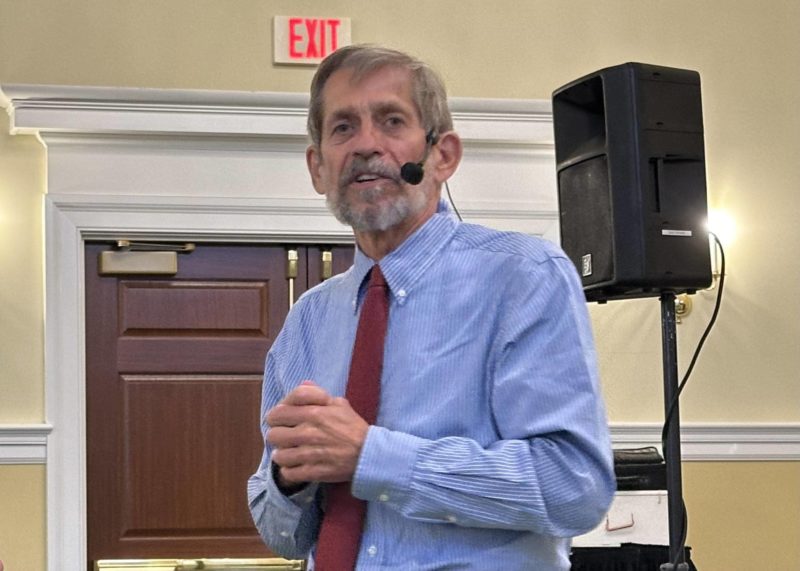By Jim Dean

At the September 4 meeting of the Retired Men’s Association Bob Phillips introduced the day’s speaker, Thomas Graham, a distinguished fellow at the Council on Foreign Relations and co-founder of the Russian, East European, and Eurasian Studies program at Yale, who delivered a talk on Russia and the US’s future role in global affairs: “Getting Russia Right: Why Russia Became an Adversary and How to Deal with It.” His extensive background includes serving on the National Security Council and as a foreign service officer at the US Embassy in Moscow.
Graham argued that contrary to some predictions, Russia is not on the verge of collapse or disintegration. The country is held together by strong centrifugal forces, including patriotism and xenophobia. Russia is unlikely to experience a democratic breakthrough, as the Kremlin has systematically dismantled opposition. Russians generally support a strong ruler who can protect them from internal chaos and external threats. Despite Western sanctions, Russia’s economy grew by about 3% in 2023 and is projected to maintain similar growth in the coming years. While facing challenges like demographic decline and underinvestment, Russia is more likely to experience gradual decline rather than sudden collapse. Importantly, 70-75% of the Russia population is ethnically Russian, making it unlikely to break apart.
Graham emphasized that whatever happens in Ukraine, Russia will remain a significant global player. It possesses the world’s largest nuclear arsenal and has world-class cyber and space capabilities, as well as significant military potential. Russia’s involvement is crucial for addressing strategic stability, cybersecurity, and non-proliferation of weapons of mass destruction. In Europe, Russia will continue to be a major factor in security arrangements. Europe must address how to manage relations with Russia, whether through cooperation or containment. The continent cannot escape the challenge of dealing with its large eastern neighbor, which has been a persistent issue for at least the past 200 years.
Russia’s influence extends to the Arctic, where it has the largest continental shelf. As global warming opens new maritime routes, Russia will play a significant role in the region’s development. In the Middle East, Russia maintains good relations with most major powers, including Turkey, Egypt, Saudi Arabia, and Iran. It has military bases in Syria, projecting power into the Eastern Mediterranean. In the Indo-Pacific region, Russia provides resources crucial for China’s growth. It also has the potential to develop relations with South Korea and Japan, potentially acting as a constraint on Chinese ambitions. This positioning allows Russia to be a significant player in the region’s geopolitical dynamics.
Graham highlighted Russia’s importance in addressing transnational issues. As one of the four largest emitters of greenhouse gases, Russia’s participation is essential in addressing climate change. Additionally, Russia’s expertise in vaccine development could be valuable in addressing future pandemics.
Given Russia’s continued global significance, Graham outlined three main objectives for US policy towards Russia. First, maintain strategic stability to reduce the risk of nuclear conflict between the two countries. Second, manage competition responsibly to avoid direct military confrontation that could escalate to nuclear conflict. Third, cooperate on a narrow range of transnational issues where collaboration is essential. Graham also hinted at a fourth objective, namely managing the relationship with Russia so as to be able to deal effectively with the growing competition from China over the years ahead.
These policy goals suggest that the United States must continue to engage with Russia on multiple fronts, despite current tensions. Diplomatic channels should be maintained to address strategic stability and manage competition. Engagement on transnational issues like climate change and pandemic preparedness is necessary. US policy in Europe, the Middle East, and the Indo-Pacific must account for Russia’s influence and interests, while Arctic policy should anticipate increased Russian activity in the region.
While sanctions have been implemented, policymakers should be aware of Russia’s economic resilience and its potential for gradual rather than sudden decline. US military and cybersecurity strategies must continue to factor in Russia’s capabilities and potential actions. Policy should be crafted with the understanding that Russia will remain a unified state and significant global actor for the foreseeable future.
In conclusion, Graham’s analysis emphasized the need for a nuanced, long-term approach to US-Russia relations. While acknowledging the current challenges and conflicts, he argued that Russia’s continued global significance necessitates ongoing engagement and strategic planning by US policymakers across various domains of international affairs. The complexity of the relationship and Russia’s enduring influence in key regions and issues underscore the importance of maintaining a balanced and pragmatic approach in dealing with this significant global player.
Graham’s talk was followed by a lengthy Q&A session.
The talk can be viewed by going to the RMA website at https://greenwichrma.org, and clicking on “Speakers.”
The RMA’s upcoming presentation, “It’s Complicated: The Decision by the United States on How—Not If—To Use the Atomic Bomb During World War II,” by Edward Aldrich, is scheduled for 11 AM on Wednesday, September 18, 2024. Ted Aldrich, author of The Partnership: George Marshall, Henry Stimson, and the Extraordinary Collaboration that Won World War II, will focus his talk on all the factors that went into the decision by Stimson who — working closely with Marshall — was given the responsibility by President Roosevelt and later President Truman to recommend how to use the atomic bomb once it was developed. Addressing many of the misconceptions which formed in the years after Hiroshima and Nagasaki as to the reasons the US used the new weapon of mass destruction, Aldrich will place the audience in the shoes of Stimson, Marshall, FDR, Truman, Jimmy Byrnes, other civilian and military figures, and the American public during the brief period of time the decision about the bombs was made and will outline all the considerations that went into the deliberations.
The author, who has lectured several times on this subject at Colgate University, will draw on extensive research he conducted while writing his book on the wartime collaboration of Stimson and Marshall and will spend a bit of time discussing the background of Secretary of War Stimson to give a sense of the man to whom so much responsibility was given.
Edward “Ted” Aldrich was born and raised in Rowayton, CT, attended Colgate University, majoring in economics and political science, and earned an MBA in finance from Boston College. He has had a distinguished career in banking beginning with UBS with posts in New York, Zurich, and London, and has held senior positions at Deutsche Bank, Fortis, and Mizuho Bank. He currently works as the head of corporate development for Auramet Trading, one of the world’s largest physical precious metals merchants.
Ted’s love of history began on the day he entered the second grade at Rowayton Elementary School and saw portraits of all the U.S. presidents on the classroom wall. Ted and his wife, Susie, have lived in Westport since 1999 where they raised three sons.
To stream the presentation by Edward Aldrich at 11 AM on Wednesday, September 18, click on https://bit.ly/30IBj21. This presentation will also be available on local public access TV channels, Verizon FIOS channel 24 and Optimum (Cablevision) channel 79. The public is also invited to attend the presentation in person at the First Presbyterian Church of Greenwich at 1 West Putnam Avenue.
Note: The views expressed in these presentations are those of the speakers. They are not intended to represent the views of the RMA or its members.
RMA speaker presentations are presented as a community service at no cost to in-person or Zoom attendees, regardless of gender. Any member of the public who would like to receive a weekly email announcement of future speakers should send a request to members@greenwichrma.org. The RMA urges all eligible individuals to consider becoming a member of our great organization, and thereby enjoy all the available fellowship, volunteer, and community service opportunities which the RMA offers to its members. For further information, go to https://greenwichrma.org/, or contact members@greenwichrma.org.



